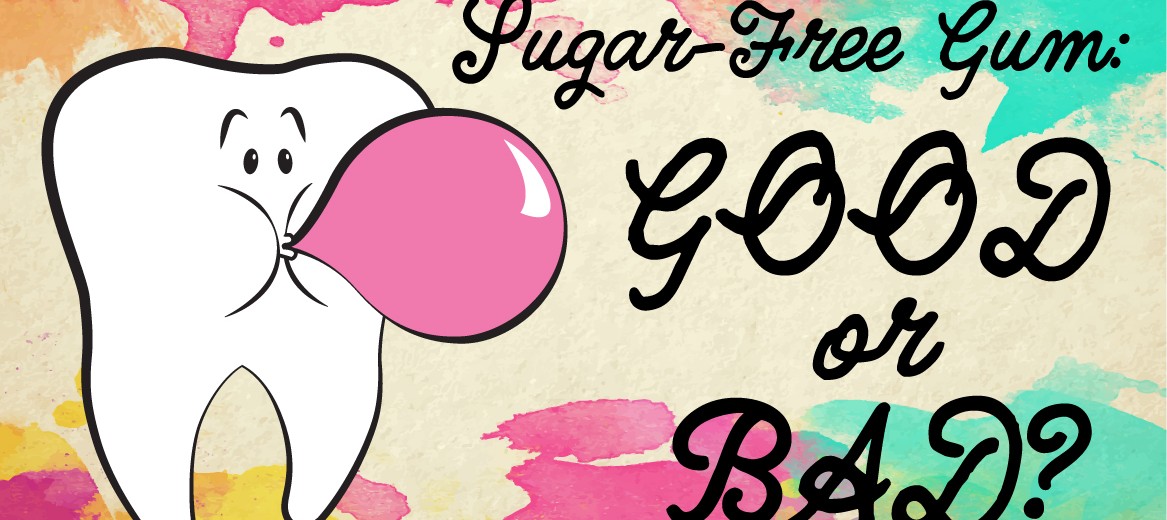At one point, The American Dental Association (ADA) website suggested that chewing gum should be the fourth step in your oral hygiene routine and suggested using it after a meal. But after digging into some research, we have found that there are some concerns to whether sugar-free gum and sugar-free products are actually helpful for your dental health.
Researchers from a study published in the British Dental Journal say that sugar substitutes in sugar-free chewing gum may decrease the risk of dental caries (tooth decay formation); yet, they also may bring another health risk, dental erosion, if they contain acidic flavoring.
“The term sugar-free may generate false security because people may automatically believe that sugar-free products are safe for teeth,” said GSDM Associate Research Professor Dr. Sok-Ja Janket, “as the use of orbital and xylitol containing products increases, the public should be educated on the hidden risk of dental erosion due to acidic additives”1. So given the current literature, finding out how some sugar-free gum is good and bad for your teeth should be considered to make sure your oral health habits are really making a positive impact.
The Good
The use of sugar-free gum, especially xylitol-sweetened gum, may reduce the level of bacteria in ones mouth and therefore reduce the risk of dental caries2. Chewing sugar-free gum helps increase production of saliva, which contains calcium and phosphates that remineralize the teeth, to help fight off sugars and other fermentable carbohydrates (like starch) from the teeth. Remineralization is the process in which the minerals are returned to the molecular structure of the tooth to strengthen it.
Salvia also neutralizes the acids in your mouth and helps restore the pH levels, aiding in the prevention of dental erosion from increased acidic levels. In addition, chewing sugar-free gum helps dislodge food particles which causes cavities from the fermentable carbohydrates.
Xylitol, a naturally occurring sugar substitute often in sugar-free gum, “has the ability to reduce the growth of oral bacteria by inhibiting glycolysis [when xylitol is taken up by bacteria and cannot be metabolized by it]”2. Xylitol have other notable properties that have made it an important sugar substitute in the dental perspective, such as inducing the production of salivary enzymes which inhibits bacterial growth in the mouth.
There are 4 other common sugar substitutes (called sugar alcohols)—sorbitol, maltitol, manitol, isomalt—that are widely used in many food and beverages. It has been widely thought that these sugar substitutes cannot be metabolized by bacteria and produce acid that causes tooth erosion, but as the author confirms some species of bacteria in your mouth can metabolize these sugar substitutes2. In other words, these sugar substitutes still have the potential to cause cavities and tooth decay. However, among all 5 of the sugar substitutes “scientific evidence indicates that xylitol demonstrates the strongest [Dental] caries prevention effect”2.
The Bad
The study published in the British Dental Journal revealed that sugar-free products can damage teeth. Researchers found the presence of acidic flavorings and preservatives in sugar-free products may have adverse dental health effects, such as dental erosion.
The acidity of individual foods can expedite erosion, however, the erosive potential “depends also on whether the oral buffer systems can neutralize the food. Because the critical pH for enamel dissolution is 5.5, any food with a pH lower than 5.5 may contribute to or stimulate erosion”2. Some sugar-free gum contain these acidic flavorings and preservatives, usually fruit flavored sugar-free products, that causes dental erosion.
Dental erosion—an irreversible mineral loss process that can cause structural damage to the teeth—leads to a hole in the tooth known as a cavity and causes tooth decay if not treated. Tooth decay can lead to pain, infection, tooth loss, periodontal disease and other dental complications.
Quick Tips: What should I chew?
- Avoid acid-containing, commonly fruit-flavored sugar-free products, may be beneficial for dental health2.
- Generally, Sugar-free products may help prevent cavities. Though, if they contain acidic additives, it may increase the likelihood of demineralizing enamel and causing dental erosion2.
- Chew Sugar-free gum with xylitol, a naturally occurring sugar substitute, that has the added benefit of non-cariogenic properties to fight off bacteria3.
- For more information on natural gum alternatives that are not packed with preservatives and additives, check out The Eight Best Chewing Gums.
Definitions:
Dental caries (decay): an oral infectious disease of the teeth in which organic acid metabolites produced by oral microorganisms lead to demineralization and destruction of the tooth structures3.
Periodontal disease: oral disease characterized by inflammation and destruction of the attachment apparatus of the teeth, including the ligamentous attachment of the tooth to the surrounding alveolar bone3.
Sugars: monosaccharides (glucose, galactose, and fructose) and disaccharides (sucrose, lactose, and trehalose)3.
Tooth erosion: The gradual loss of the hard surface of the tooth called tooth enamel due to chemical (acid), not bacterial, processes.
Sources:
1. Does Sugar-free Mean Good for Your Teeth? » Dental School | News Archive | Boston University. (2011, October 11). Retrieved December 31, 2015, from https://www.bu.edu/dental/2011/10/11/does-sugar-free-mean-good-for-your-teeth/
2. Nadimi, H., Wesamaa, H., Janket, S., Bollu, P., & Meurman, J. (2011). Are Sugar-Free Confections Really Beneficial for Dental Health? British Dental Journal, 1-5. Retrieved December 31, 2015, from
3. Touger-Decker, Riva, and Cor Van Loveren. “Sugar and Dental Caries.” American Society of Clinical Nutrition (2003): 881S-92S. The American Journal of Clinical Nutrition. Web. 26 May 2015. <http://ajcn.nutrition.org/content/78/4/881S.full>.





